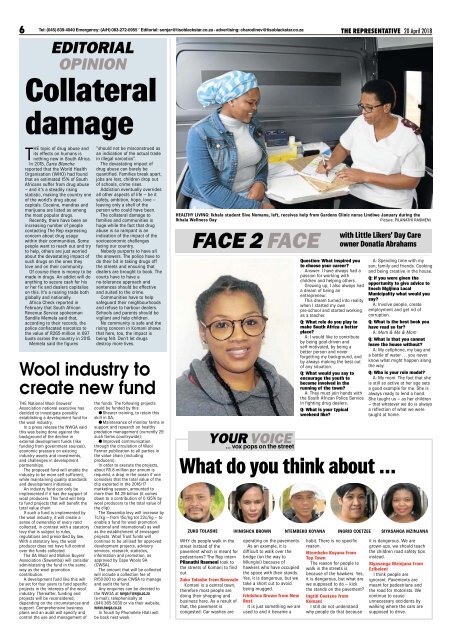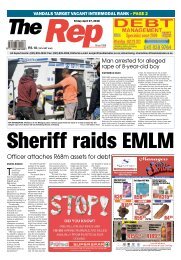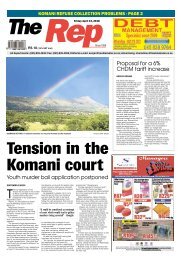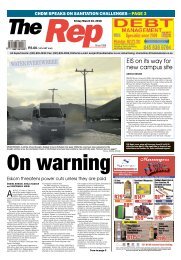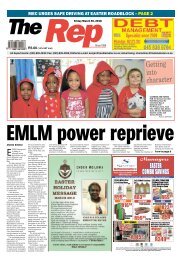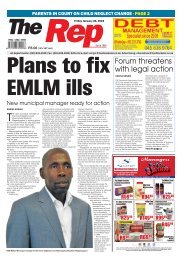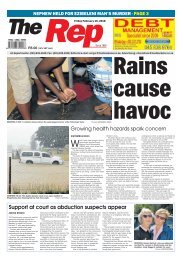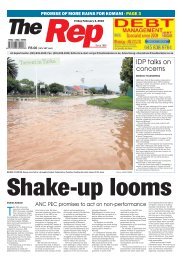The Rep 20 April 2018
You also want an ePaper? Increase the reach of your titles
YUMPU automatically turns print PDFs into web optimized ePapers that Google loves.
6<br />
Tel: (045) 839-4040 Emergency: (A/H) 083-272-0955 ° Editorial: sonjar@tisoblackstar.co.za - advertising: charodinev@tisoblackstar.co.za<br />
THE REPRESENTATIVE <strong>20</strong> <strong>April</strong> <strong>20</strong>18<br />
EDITORIAL<br />
OPINION<br />
C o l l ate r a l<br />
damage<br />
THE topic of drug abuse and<br />
its effects on humans is<br />
nothing new in South Africa.<br />
In <strong>20</strong>15, Carte Blanche<br />
reported that the World Health<br />
Organisation (WHO) had found<br />
that an estimated 15% of South<br />
Africans suffer from drug abuse<br />
– and it’s a steadily rising<br />
statistic, making the country one<br />
of the world’s drug abuse<br />
capitals. Cocaine, mandrax and<br />
marijuana are listed as among<br />
the most popular drugs.<br />
Recently, there have been an<br />
increasing number of people<br />
contacting <strong>The</strong> <strong>Rep</strong> expressing<br />
concern about drug usage<br />
within their communities. Some<br />
people want to reach out and try<br />
to help, others are just worried<br />
about the devastating impact of<br />
such drugs on the ones they<br />
love and on their community.<br />
Of course there is money to be<br />
made in drugs. An addict will do<br />
anything to secure cash for his<br />
or her fix and dealers capitalise<br />
on this. It’s a roaring trade both<br />
globally and nationally.<br />
Africa Check reported in<br />
February that South African<br />
Revenue Service s p o ke s m a n<br />
Sandile Memela said that,<br />
according to their records, the<br />
police confiscated narcotics to<br />
the value of R265-million in 697<br />
busts across the country in <strong>20</strong>15.<br />
Memela said the figures<br />
“should not be misconstrued as<br />
an indication of the actual trade<br />
in illegal narcotics”.<br />
<strong>The</strong> devastating impact of<br />
drug abuse can barely be<br />
quantified. Families break apart,<br />
jobs are lost, children drop out<br />
of schools, crime rises.<br />
Addiction eventually overrides<br />
all other aspects of life – be it<br />
safety, ambition, hope, love –<br />
leaving only a shell of the<br />
person who could have been.<br />
<strong>The</strong> collateral damage to<br />
families and communities is<br />
huge while the fact that drug<br />
abuse is so rampant is an<br />
indication of the impact of the<br />
socioeconomic challenges<br />
facing our country.<br />
Nobody purports to have all<br />
the answers. <strong>The</strong> police have to<br />
do their bit in taking drugs off<br />
the streets and ensuring that<br />
dealers are brought to book. <strong>The</strong><br />
courts have to have a<br />
no-tolerance approach and<br />
sentences should be effective<br />
and suited to the crime.<br />
Communities have to help<br />
safeguard their neighbourhoods<br />
and refuse to harbour dealers.<br />
Schools and parents should be<br />
vigilant and help children.<br />
No community is safe and the<br />
rising concern in Komani shows<br />
that here, too, the impact is<br />
being felt. Don’t let drugs<br />
destroy more lives.<br />
Wool industry to<br />
create new fund<br />
THE National Wool Growers’<br />
Association national executive has<br />
decided to investigate possibly<br />
establishing a development fund for<br />
the wool industry.<br />
In a press release the NWGA said<br />
this was being done against the<br />
background of the decline in<br />
external development funds (like<br />
funding from government sources),<br />
economic pressure on existing<br />
industry assets and investments,<br />
and challenges in development<br />
par tnerships.<br />
<strong>The</strong> proposed fund will enable the<br />
industry to be more self sufficient,<br />
while maintaining quality standards<br />
and development initiatives.<br />
An industry fund can only be<br />
implemented if it has the support of<br />
wool producers. This fund will help<br />
to fund projects that will benefit the<br />
total value chain.<br />
If such a fund is implemented by<br />
the wool industry, it will create a<br />
sense of ownership of every rand<br />
collected, in contrast with a statutory<br />
levy that is subject to rules,<br />
regulations and prescribed by law.<br />
With a statutory levy, the wool<br />
producer does not have full control<br />
over the funds collected.<br />
<strong>The</strong> SA Wool and Mohair Buyers’<br />
Association (Sawamba) will consider<br />
administering the fund in the same<br />
way as the wool promotion<br />
cont ribution.<br />
A development fund like this will<br />
be set for four years to fund specific<br />
projects in the interests of the wool<br />
industry. <strong>The</strong>reafter, funding and<br />
projects will be reconsidered,<br />
depending on the circumstances and<br />
support. Comprehensive business<br />
plans and an audit will specify and<br />
control the use and management of<br />
the funds. <strong>The</strong> following projects<br />
could be funded by this:<br />
ýShearer training, to retain this<br />
skill in SA;<br />
ýMaintenance of monitor farms in<br />
support and research on healthy<br />
predation management (currently 29<br />
such farms countrywide);<br />
ýImproved communication<br />
through the circulation of Wool<br />
Farmer publication to all parties in<br />
the value chain (including<br />
producers).<br />
In order to execute the projects,<br />
about R5.8-million per annum is<br />
required, a drop in the ocean if one<br />
considers that the total value of the<br />
clip exported in the <strong>20</strong>16/17<br />
marketing season, amounted to<br />
more than R4.29-billion (it comes<br />
down to a contribution of 0.135% by<br />
wool producers to the total value of<br />
the clip).<br />
<strong>The</strong> Sawamba levy will increase by<br />
7c/kg – from 15c/kg tot 22c/kg – to<br />
enable a fund for wool promotion<br />
(national and international) as well<br />
as the establishment of envisaged<br />
projects. Wool Trust funds will<br />
continue to be utilised for approved<br />
development projects, advisory<br />
services, research, statistics,<br />
information and promotion, as<br />
approved by Cape Wools SA<br />
(CWSA).<br />
<strong>The</strong> amount that will be collected<br />
will include a collection fee of<br />
R150 000 to allow CWSA to manage<br />
and audit the fund.<br />
Any enquiries can be directed to<br />
the NWGA at nwga@nwga.co.za<br />
(e-mail), telephonically at<br />
(041) 365-5030 or via their website,<br />
w w w. n w g a . c o . z a .<br />
In Touch by Phumelele Hlati will<br />
be back next week.<br />
HEALTHY LIVING: Ikhala student Sive Nomana, left, receives help from Gardens Clinic nurse Lindiwe January during the<br />
Ikhala Wellness Day<br />
Picture: PILANATHI RASMENI<br />
FACE 2 FA C E<br />
ZUKO TOLASHE<br />
YOUR VOICE<br />
WHY do people walk in the<br />
street instead of the<br />
pavement which is meant for<br />
pedestrians? <strong>The</strong> <strong>Rep</strong> intern<br />
Pilanathi Rasmeni took to<br />
the streets of Komani to find<br />
out.<br />
Zuko Tolashe from Newvale<br />
Komani is a central town,<br />
therefore most people are<br />
doing their shopping and<br />
business here. As a result of<br />
that, the pavement is<br />
congested. Car washes are<br />
... vox pops on the street<br />
What do you think about ...<br />
IVINISHCA BROWN NTEMBEKO KOYANA INGRID COETZEE SIYASANGA MZINJANA<br />
operating on the pavements.<br />
As an example, it is<br />
difficult to walk over the<br />
bridge (on the way to<br />
Mlungisi) because of<br />
hawkers who have occupied<br />
the space with their stands.<br />
Yes, it is dangerous, but we<br />
take a short cut to avoid<br />
being mugged.<br />
Ivinishca Brown from New<br />
Re s t<br />
It is just something we are<br />
used to and it became a<br />
Question: What inspired you<br />
to choose your career?<br />
Answer: I have always had a<br />
passion for working with<br />
children and helping others.<br />
Growing up, I also always had<br />
a dream of being an<br />
ent repreneur.<br />
This dream turned into reality<br />
when I started my own<br />
pre-school and started working<br />
as a teacher.<br />
Q: What role do you play to<br />
make South Africa a better<br />
p l a c e?<br />
A: I would like to contribute<br />
by being goal-driven and<br />
self-motivated, by being a<br />
better person and never<br />
forgetting my background, and<br />
by always making the best out<br />
of any situation.<br />
Q: What would you say to<br />
encourage the youth to<br />
become involved in the<br />
running of the town?<br />
A: <strong>The</strong>y must join hands with<br />
the South African Police Service<br />
in fighting drug dealers.<br />
Q: What is your typical<br />
weekend like?<br />
habit. <strong>The</strong>re is no specific<br />
reason.<br />
Ntembeko Koyana from<br />
Top Town<br />
<strong>The</strong> reason for people to<br />
walk in the streets is<br />
because of the hawkers. Yes,<br />
it is dangerous, but what are<br />
we supposed to do – kick<br />
the stands on the pavement?<br />
Ingrid Coetzee from<br />
Ko m a n i<br />
I still do not understand<br />
why people do that because<br />
with Little Likers’ Day Care<br />
owner Donatia Abrahams<br />
A: Spending time with my<br />
son, family and friends. Cooking<br />
and being creative in the house.<br />
Q: If you were given the<br />
opportunity to give advice to<br />
Enoch Mgijima Local<br />
Municipality what would you<br />
say?<br />
A: Involve people, create<br />
employment and get rid of<br />
corruption.<br />
Q: What is the best book you<br />
have read so far?<br />
A: Mom & Me & Mom<br />
Q: What is that you cannot<br />
leave the house without?<br />
A: My cellphone, my bag and<br />
a bottle of water ... you never<br />
know what might happen along<br />
the way.<br />
Q: Who is your role model?<br />
A: My mom. <strong>The</strong> fact that she<br />
is still so active at her age sets<br />
a good example for me. She is<br />
always ready to lend a hand.<br />
She taught us – as her children<br />
– t h at whatever we do is always<br />
a reflection of what we were<br />
taught at home.<br />
it is dangerous. We are<br />
grown-ups, we should teach<br />
the children road safety tips<br />
i n st e a d .<br />
Siyasanga Mzinjana from<br />
E zibeleni<br />
I think people are<br />
ignorant. Pavements are<br />
meant for pedestrians and<br />
the road for motorists. We<br />
continue to cause<br />
unnecessary accidents by<br />
walking where the cars are<br />
supposed to drive.


